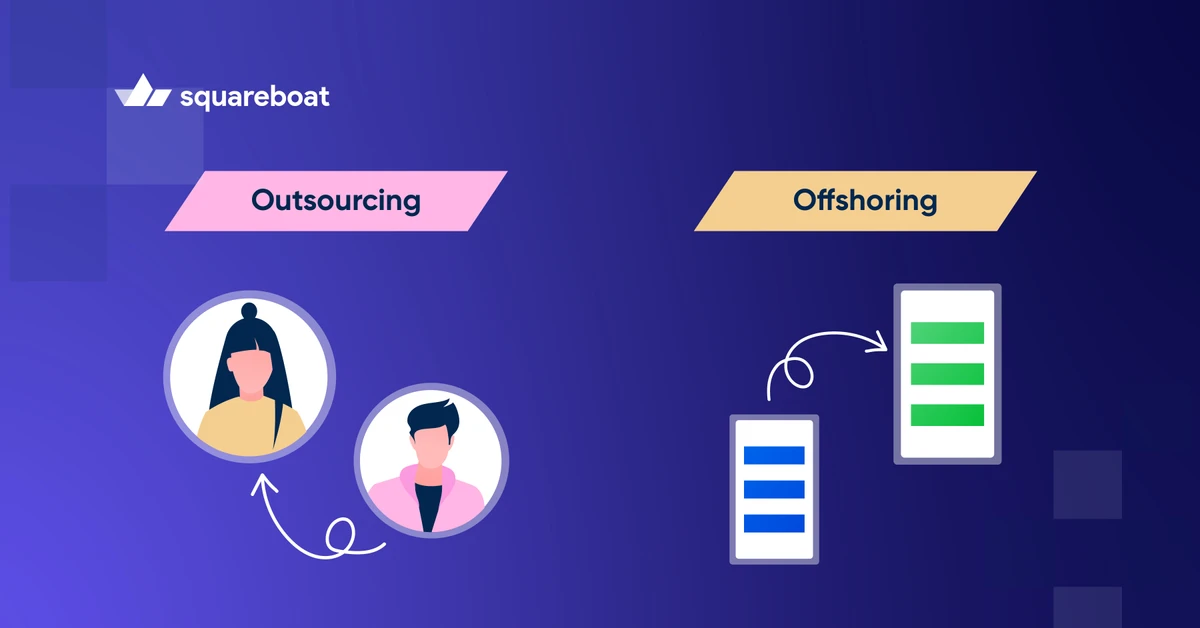Businesses are constantly seeking smarter ways to boost productivity while reducing expenses. Outsourcing and offshoring stand out as two of the most effective strategies, yet people often mix them up. Outsourcing means handing over specific jobs to external service providers, while offshoring relocates entire business operations to a different country. Both methods help firms save cash, tap into skilled workers, and improve their processes, but they also bring their own set of problems. Understanding the difference between outsourcing vs offshoring enables companies to make smart choices that match their aims to pave the way for long-term success in an ever more cutthroat market.
Outsourcing vs Offshoring: Key Differences
Understanding the difference main between offshoring and outsourcing is crucial for businesses seeking operational efficiency and cost reduction. Below is a comprehensive comparison of the two strategies.
| Aspect | Outsourcing | Offshoring |
| Definition | Hiring an external company to perform specific tasks or services instead of handling them in-house. | Relocating business operations to another country to take advantage of lower costs and global talent. |
| Primary Objective | Focus on efficiency, cost savings, and accessing specialized skills. | Reduce labor costs, expand market reach, and enhance global presence. |
| Geographical Scope | Can be local (within the same country) or international. | Always involves shifting operations to a foreign country. |
| Who Handles the Work? | A third-party service provider (external vendor or contractor). | A dedicated team or subsidiary set up by the company in another country. |
| Cost Savings | Moderate savings through reduced overhead and operational expenses. | Significant savings due to lower wages, infrastructure costs, and tax benefits. |
| Control & Oversight | Less control since an external vendor manages the process. | More control as the company operates directly in the offshore location. |
| Flexibility | Highly flexible—businesses can scale services up or down as needed. | Requires long-term commitment and strategic investment. |
| Common Use Cases | Customer support, IT services, content creation, payroll processing, and digital marketing. | Manufacturing, software development, research and development (R&D), and call centers. |
| Risks & Challenges | Data security concerns, quality control issues, and dependency on external vendors. | Cultural differences, legal complexities, and political and economic uncertainties. |
| Business Impact | Short-term cost reduction and operational efficiency. | Long-term growth, market expansion, and competitive advantage. |
What is Outsourcing?
Outsourcing happens when a company hires outside help to do specific jobs, provide services, or handle processes instead of doing them in-house. It can be in the form of hiring external companies or even freelancers to handle specific tasks. It helps companies save money, work better, and tap into expert skills without needing to hire full-time staff or build infrastructure. Businesses often outsource tasks that aren't central to their core work, like IT help, customer support, payroll, and online marketing. This approach lets businesses focus on their strengths while leveraging external expertise to improve overall performance. Companies can outsource locally or internationally based on costs and what the business needs.
Pros and Cons of Outsourcing:
Pros:
- Cost Savings Without Overhead: When you outsource, you don't have to spend on hiring, training, or keeping in-house teams. Companies can work with skilled pros without buying office space, gear, or giving employee perks.
- Instant Access to Expertise: Businesses can team up with experts who know their stuff in areas like IT, marketing, customer help, and legal work, making sure the work is top-notch.
- Increased Focus on Core Business: By handing off routine jobs and tasks that aren't central to the business, companies can put their energy into new ideas, planning, and making customers happy, which helps them grow over time.
- Scalability and Flexibility: Outsourcing lets businesses grow or shrink their operations fast based on what the market needs, without the headache of hiring or letting people go.
Speed and Efficiency: Outside companies have well-oiled processes and skilled teams, which result in quicker delivery times and better output.
Cons:
- Loss of Direct Control: Giving tasks to outside companies means businesses don't have as much say over how things get done, how good the work is, and when projects finish.
- Data Security Risks: Sharing private info with other companies makes it more likely that data could get stolen, leaked, or not follow privacy rules.
- Communication Barriers: Different languages, ways of working, and time zones can lead to mix-ups, slowdowns, and work not getting done as well.
- Hidden Costs and Dependence on Vendors: Even though outsourcing saves money at first, companies might have to pay extra later to change contracts, get better services, or because they depend too much on the other company.
Inconsistent Quality: How good the work is can be different depending on who's doing it, which might make people unhappy with what they get, and they need things fixed.
What is Offshoring?
Offshoring is the process of moving business operations to another country to cut costs, access skilled workers, and find a better business environment. Many industries like manufacturing, IT, and customer service use this approach. Companies set up offices, factories, or service hubs in places where labor and running costs are much lower than at home. This helps businesses improve their operational efficiency, boost profits, and keep up with global rivals. But offshoring also brings challenges. These include dealing with cultural gaps, complex rules, and the need for clear communication to keep things running across borders.
Pros and Cons of Offshoring:
Pros:
- Significant Cost Savings: Companies can save a lot by paying less for work and running costs when they move jobs overseas. They can get top-notch work done in countries where wages are lower, where they have to spend way less than they would at home.
- Access to a Global Talent Pool: Businesses can hire skilled workers from all over the globe in fields like tech, customer care, and manufacturing. For example, India and the Philippines are go-to places for IT and help desk services.
- Round-the-Clock Operations: By using time differences, companies can keep going 24 hours a day. This means they can help customers anytime and finish projects faster.
- Scalability and Expansion: Sending work abroad helps companies break into markets in other countries. It lets them build a name for themselves worldwide and find new ways to make money.
Tax and Regulatory Benefits: Lots of countries give tax incentives, lower tariffs, and business-friendly rules to pull in foreign firms. This leads to unparalleled financial advantages.
Cons:
- Cultural and Language Barriers: Differences in work ethics, communication styles, and language proficiency can create misunderstandings and productivity challenges.
- Compliance and Legal Issues: Companies need to deal with tricky foreign labor laws, tax rules, and data protection laws, which take time and money.
- Political and Economic Risks: Unstable foreign governments, fluctuating exchange rates, and sudden regulatory changes can disrupt operations and impact profits.
- Integration and Coordination Challenges: Running offshore teams needs strong leaders, structured processes, and good teamwork tools to keep things running smoothly.
Employee Morale and Job Security Concerns: Workers at home might worry about offshoring, which can make them less happy at work, less productive, and resistant to change.
Conclusion
Outsourcing and offshoring are effective ways for companies to cut costs, boost productivity, and grow their operations. Choosing between outsourcing and offshoring can be challenging, but understanding what is offshoring vs outsourcing makes the decision clearer. Outsourcing works best for businesses that need specific skills and flexibility, while offshoring suits those looking to expand and reduce operating expenses. The best option depends on company goals, industry needs, and long-term plans. A well-thought-out approach to outsourcing or offshoring can give businesses an edge over competitors. This allows them to focus on growth and new ideas while tapping into global talent and resources. Choosing the right path will shape a company's success in the ever-changing global market.


